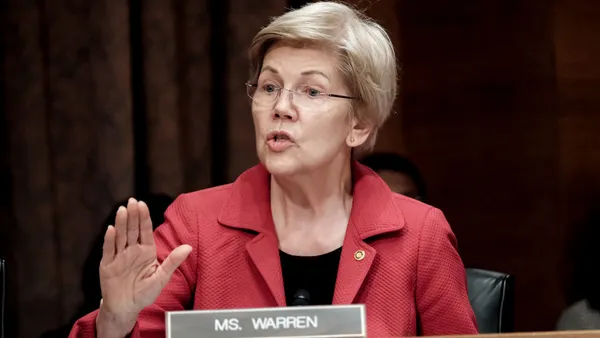UPDATE: Sept. 29, 2021: German financial regulator BaFin ordered Berlin-based challenger bank N26 to pay €4.25 million ($5 million) over delayed anti-money laundering-related suspicious activity reports, Reuters reported Tuesday.
"N26 takes its responsibility in the fight against the growing threat of global financial crime, and in the prevention of money laundering, very seriously," the neobank said, adding that it paid the penalty in July, and that the case encompassed fewer than 50 activity reports from 2019 and 2020.
Dive Brief:
- German financial regulator BaFin ordered Berlin-based challenger bank N26 on Tuesday to fix deficiencies in its IT monitoring and customer due diligence.
- The regulator also is appointing a special commissioner — the audit firm Mazars, sources told the Financial Times — to oversee the bank’s progress.
- N26, in a statement seen by the Times, said it has "massively advanced" its money laundering controls. "Nonetheless we acknowledge that more needs to be done in that area," the company said, adding that e-commerce fraud has "accelerated significantly" since the COVID-19 pandemic began.
Dive Insight:
Under the order, N26 must "ensure that it has the adequate personnel, technical and organizational resources to comply with ... anti-money laundering law," BaFin said.
The regulator asked the company to meet each of the benchmarks in a limited time frame but didn’t detail the duration in a statement Wednesday.
N26 on Wednesday vowed to improve its transaction monitoring, implement additional identity-verification measures for clients, and further boost its anti-money laundering resources, according to the Financial Times.
This isn’t N26’s first run-in with BaFin. The regulator first ordered the challenger bank to strengthen its anti-money laundering practices in May 2019. It ordered N26 to hire more staff, improve the way it documents its compliance processes, rerun checks on some existing customers and eliminate transaction monitoring backlogs.
BaFin, too, though, has suffered a lull in credibility. The German government in January dismissed BaFin’s president, Felix Hufeld, over the regulator’s handling of the Wirecard accounting scandal.
The appointment of a special monitor is a rarity in itself. BaFin has assigned such a commissioner only one other time — KPMG, to oversee Deutsche Bank’s compliance with a 2018 order. BaFin last month expanded KPMG’s role and told Deutsche to ramp up its financial crime prevention measures after the auditor found shortcomings.
BaFin launched an audit of N26 in 2018 after the German business magazine WirtshaftWoche found users could open accounts under a false name.
N26, at the time, said it was updating its identity verification process to prevent account-opening fraud, according to The Wall Street Journal.
In 2019, N26’s co-chief executive, Valentin Stalf, told the Financial Times the bank’s issues had mostly been fixed and were never as grave as suggested in the press.
"We have a full banking license and we comply with every law there is," Stalf said. "There were some things that BaFin criticized that we tackled immediately, and others that we had been working on already."
The challenger bank is looking to file an initial public offering within the next two years, Bloomberg reported in October.
The company, which launched in the U.S. in 2019, said in February it plans to add 200 employees stateside this year — a 75% increase. It abandoned the U.K. market last year, citing Brexit.












